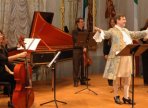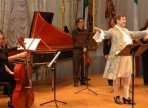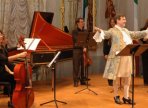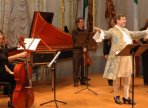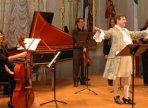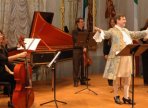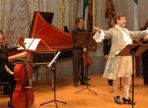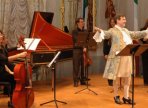BALDASSARE GALUPPI, called ‘Il Buranello’ (the man from Burano), an Italian composer (Burano, Venice 18.10.1706 – 3.1.1785) began his first studies under the direction of his father who played the violin in the local theatre. He composed his first opera when he was very young ‘La fede nell’incostanza ossia gli amici rivali’, staged in both Chioggia and Vicenza and, persuaded by the lack of success of that opera, decided to dedicate his time to serious studies, and so became the favourite pupil of Lotti where he studied composition and harpsichord. He went to Florence in 1726 as the harpsichord player in the Pergola theatre and, on his return to Venice, enjoyed success with ‘Gli odi delusi dal sangue’, written in 1728 in collaboration with G.B. Pescetti In 1740 he was nominated Choir Master of the Ospedale dei Mendicanti, and in 1741 travelled to London to stage several operas in the Haymarket theatre as a ‘serious composer of Italian opera’. He returned to Venice and in 1748 became deputy-choirmaster and, in 1762, Choirmaster of St. Mark’s Cathedral and Choirmaster of the Ospedale degli Incurabili. In 1765 Catherine of Russia obtained permission from the Venetian authorities for his transfer to St. Petersburg where he remained until 1768 as Court Choirmaster and Composer of the Italian …………….. Covered with honours and loaded with gifts, he came back to Venice to take up again the posts he had left on his departure and he spent his time mainly composing oratories for the Incurabili and sacred music Among the composers active around the middle of the ‘700s. Galuppi was perhaps the most successful, certainly the most significant in northern Italy. Thanks to the variety of the genres dealt with, his abundant production demonstrates all the most important aspects of the musical activity of those times and clearly documents the stylistic tendencies. Initially, he was active as a harpsichord player and choirmaster and his duties would have involved the re-elaboration of works by others; Galuppi then went on to compose pastoral fables and, above all, serious operas, the type, that is, which made him famous and which he composed continuously until he retired in 1773. Only much later did he become famous as the author of comic opera, while his sacred compositions were much appreciated in the last years of his life.


